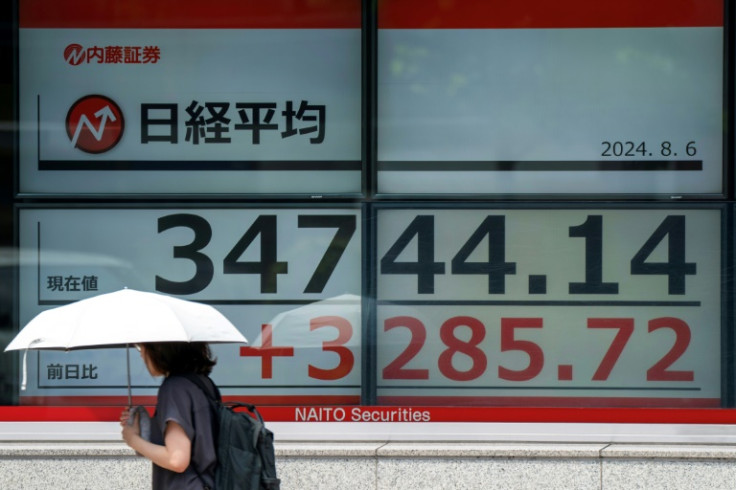
Most stock markets fell Thursday after a sell-off on Wall Street, with analysts warning the volatility that has roiled markets this week still has some time to run as traders fret over the global economy.
Data last Friday showing that fewer US jobs than expected were created in July continues to reverberate as it fanned fears that the world's top economy was heading for recession.
While a soft labour market reading would usually have been taken as a positive, giving more ammunition for the Federal Reserve to cut interest rates, investors are beginning to fear it shows the central bank may have waited too long to move.
Weak earnings from Disney, Airbnb and TripAdvisor added to the sense of concern that American consumers were tightening their belts as the impact of elevated inflation and two-decade-high borrowing costs bite.
Fed boss Jerome Powell last week indicated officials could cut at its September meeting, with 25 basis points seen as the likely move, but traders are now eyeing as many as 50 points, with another 50 possibly before the end of the year.
But the prospect of several reductions has been offset by a risk-off mood, which has been exacerbated by profit-taking in the tech sector, which has soared this year on the back of a rush for all things related to artificial intelligence.
All three main indexes on Wall Street ended in the red, having given up big gains at the start of the day, with a poorly received US Treasury bond auction adding to the downbeat mood.
And Asia followed suit in the morning, having bounced back over the previous two days from Monday's collapse, though some managed to eke out some gains.
Tokyo, Sydney, Seoul, Wellington, Mumbai, Taipei and Jakarta were in the red, along with London, Paris and Frankfurt.
Hong Kong, Singapore, Manila and Bangkok rose while Shanghai was flat.
Analyst Stephen Innes warned the rollercoaster ride for markets might not yet be over.
"The potential for a broader U.S. economic slowdown, misaligned global monetary policies, and the bubbling geopolitical tensions in the Middle East cast long, ominous shadows across financial markets," he wrote in his Dark Side Of The Boom newsletter.
"Furthermore, the US political election looms, potentially turning the markets into more of a chaotic mosh pit than a graceful waltz."
However, Rania Gule at XS.com said the losses in Wall Street "might have been mere corrections in a stock market that hit record highs this year, partly due to the hype around artificial intelligence technology, with prices having risen too rapidly and excessively relative to corporate earnings".
"The only way stocks might seem less expensive is either through lower prices or increased earnings. With high expectations for earnings growth, this could support a rebound in markets worldwide."
The yen edged back up against the dollar after tumbling Wednesday in reaction to a dovish signal from the Bank of Japan that it will not further hike interest rates again -- having lifted last week for the first time in 17 years -- while markets remain volatile.
The BoJ's decision to hike rates last week, hours before the Fed hinted at its September cut, sent the Japanese unit surging, just weeks after it hit a nearly four-decade low.
Analysts said the move had sparked a massive reversal of the "carry trade" in which traders took advantage of the weaker currency to buy higher-yielding assets such as equities.
Still, Stefan Angrick at Moody's Analytics saw the BoJ sticking to its monetary tightening.
"We and the consensus now expect the BoJ to hike rates once more this year and again next year, which will lead to further yen appreciation and lower prices for Japanese equities," he told AFP.
"Yen trading still looks a bit speculative, but that should fade as rates in Japan go up while rates in the US go down.
"Although we don't expect the BoJ to change course, it's a distinct possibility. The BoJ was forced to reverse course after past rate hikes, so it wouldn't be the first time."
Tokyo - Nikkei 225: DOWN 0.7 percent at 34,831.15 (close)
Hong Kong - Hang Seng Index: UP 0.1 percent at 16,891.83 (close)
Shanghai - Composite: FLAT at 2,869.90 (close)
London - FTSE 100: DOWN 1.2 percent at 8,071.31
Dollar/yen: DOWN at 145.90 yen from 146.83 yen on Wednesday
Euro/dollar: UP at $1.0936 from $1.0925
Pound/dollar: UP at $1.2700 from $1.2692
Euro/pound: UP at 86.15 pence from 86.06 pence
West Texas Intermediate: DOWN 0.5 percent at $74.88 per barrel
Brent North Sea Crude: DOWN 0.5 percent at $77.93 per barrel
New York - Dow: DOWN 0.6 percent at 38,763.45 (close)







